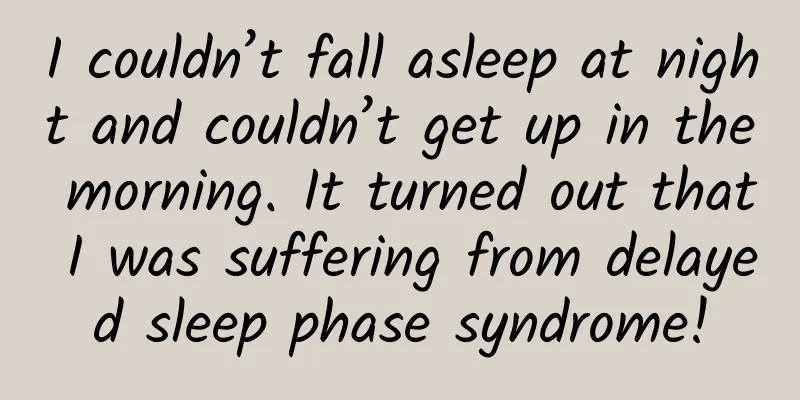I couldn’t fall asleep at night and couldn’t get up in the morning. It turned out that I was suffering from delayed sleep phase syndrome!

|
It’s cold outside, are you even more reluctant to get up from your bed? I believe that staying in bed in winter is the ideal and source of happiness for many people. It is so comfortable to lie in the warm bed! Not only do people stay in bed too long, but many people also enter a "hibernation period" in the winter and always feel like they can't wake up. Maybe I just don't want to go to work. Poor blood flow in winter, easy to feel sleepy The temperature drops in winter, and the influence of temperature will cause the human body's blood pressure to be 12/6 mmHg higher in winter than in summer. There is evidence that for every 1°C drop in temperature, systolic blood pressure increases by 1.3 mmHg and diastolic blood pressure increases by 0.6 mmHg. This is because when the temperature drops, the level of adrenaline in the human body rises, and the blood vessels on the surface of the body contract to reduce heat dissipation. At the same time, adrenaline accelerates the heart rate and increases cardiac output, leading to increased blood pressure. Vasoconstriction leads to poor blood flow and reduced oxygen supply, making people prone to drowsiness. Image source: hippopx In addition to the impact of temperature changes, drowsiness in winter is also closely related to our body's sleep regulation mechanism. Changes in circadian rhythms affect sleep Human sleep and wakefulness are regulated by two mechanisms: circadian rhythm (biological clock) and sleep homeostasis. The circadian rhythm biological clock is a timing system in the body that causes the body's behavior and physiology to exhibit a rhythm close to 24 hours. At the same time, it can be affected by external environmental factors and the rhythm can be reset. Image source: pexels Circadian rhythm exists in everyone, and the suprachiasmatic nucleus plays an important role in the regulation of circadian rhythm. When light shines on the retina, it generates a signal that is transmitted to the suprachiasmatic nucleus through the visual pathway from the retina to the hypothalamus. After receiving the "it's daytime" signal, the suprachiasmatic nucleus adjusts the body's biological clock to make it consistent with the clues provided by the external environment. Image source see watermark As winter approaches, the length of day and night changes, especially in northern my country. You will find that the days are getting shorter and the nights are getting longer. Under such lighting cues, people will inevitably feel sleepy early. Moreover, as the length of light decreases in winter, the secretion of melatonin in the human body increases, while the secretion of thyroid hormones decreases. These changes in hormones are more likely to make people drowsy and listless... Moreover, when we sleep, how much we sleep or how little we sleep is also regulated by genes. Some scholars have found that there is a protein called DEC2 in the body. If one of the amino acids on it changes (the 384th proline becomes arginine), people will show the phenotype of "sleeping less", and the average sleep time will be reduced to an average of 6.25 hours a day, while the normal sleep time is 8.06 hours. (So, don't envy those who sleep less and are energetic in winter, this is determined by genes!) It’s not that I can’t wake up, it’s that the rhythm is different! Due to environmental reasons, many people feel sleepy in winter, but there are also some people who seem to be very sleepy no matter what time they see them, and seem to be drowsy all year round. In this case, it is possible that they have delayed sleep phase syndrome. Delayed sleep phase syndrome (DSPS) is a common circadian rhythm disorder. It is reported that the prevalence rate among adolescents is 7%, and 5%-10% of insomnia patients in sleep disorder clinics complain of delayed sleep. The clinical manifestations of DSPS are: (1) The time of falling asleep and waking up is later than the normal social schedule, and the daily sleep records show that the sleep phase delay lasts for more than 2 consecutive weeks and lasts for more than 1 month; (2) The actual time of falling asleep is roughly the same every day, usually after 2 a.m.; (3) Once asleep, sleep duration and quality remain normal; (4) Difficulty getting up in the morning; (5) Even forcing patients to follow a regular schedule will not advance their sleep time. If a person suffers from a strange disease like delayed sleep phase syndrome, he will definitely not be able to wake up in the morning. Moreover, if you are an office worker or student, you are forced to get up early when you are still half asleep. The symptoms you experience are that you cannot fall asleep at night and feel sleepy and listless during the day! What’s worse, being late is commonplace. Delayed sleep phase syndrome is closely related to mental disorders. In outpatient clinics, the most common patient is depression, and winter is also the season when seasonal affective disorder is more prevalent. Seasonal Affective Disorder Seasonal affective disorder, also known as "winter depression," This disease often occurs at a specific time of the year and usually resolves on its own afterwards. The probability of occurrence is higher in winter. Symptoms of patients include being easily sad, craving sweets, weight gain, daytime sleepiness or sleeping too much, but still feeling tired and lacking energy after waking up. Some people also have difficulty concentrating on work and have difficulty getting along with others. Image source: Mr. Bean If you feel uncontrollable sadness and can't sleep in the winter, and suffer from "winter depression", the best way is to try to maintain a regular schedule, go out for exercise, and feel the sunshine and air in the slightly cool air. Although it is comfortable to stay in a warm bed, going out may bring new experiences! No matter what causes the difficulty of getting up in winter, we should try our best to adjust ourselves and maintain both physical and mental health! END Review expert: Yin Tielun, deputy chief physician of the Department of Neurology, Airport Campus, Peking University Third Hospital. Tadpole Musical Notation original article, please indicate the source when reprinting Editor/Xiao Xitushuo |
>>: Not all sharks are so vicious!
Recommend
Pinduoduo Product Analysis Report
In the market structure where Alibaba and JD.com ...
【Yangyang】Material Decryption Season 1 VR Advanced Material Tutorial [HD Quality with Materials]
Course Description This course is divided into 5 p...
The correct approach to enterprise short video operation
First of all, for enterprises, it is obviously no...
How can old brands be revived on Xiaohongshu?
In the past three years, we have witnessed countl...
Are tall people more likely to have lumbar disc herniation?
Rumor: "Tall people have a heavy burden on t...
Jiaxing Mini Program Customization Company, how much does it cost to customize a nutritional product mini program?
How much is the quote for customized nutritional ...
Beware! These eating habits may ruin your thyroid gland!
You may think that thyroid disease is far away fr...
Solar panels: a protective umbrella for space exploration
Just like a close couple would celebrate their lo...
We published an article in Physics Today, revealing another Nobel Prize-winning contribution of Wu Jianxiong that was buried
From the meeting at Yang Zhenning's home in 2...
In March, when spring comes and flowers bloom, do you know how bees collect honey?
As the temperature continues to rise, the atmosph...
That grill master may be a master of chemistry
Editor’s Note: Barbecue is nature's gift to m...
YouTube Display Ads: How to Choose Ad Placements and Increase Conversions?
Regarding the definition of Google Display Networ...
Create a father for yourself: How Google changed the world again
The giant Google is going to reorganize. On Augus...
4 key data of the top 10 short video applications!
Do you know which short video app is used the lon...
iOS - Solution to NSTimer circular reference
Occurrence scenario In Controller B there is a NS...









